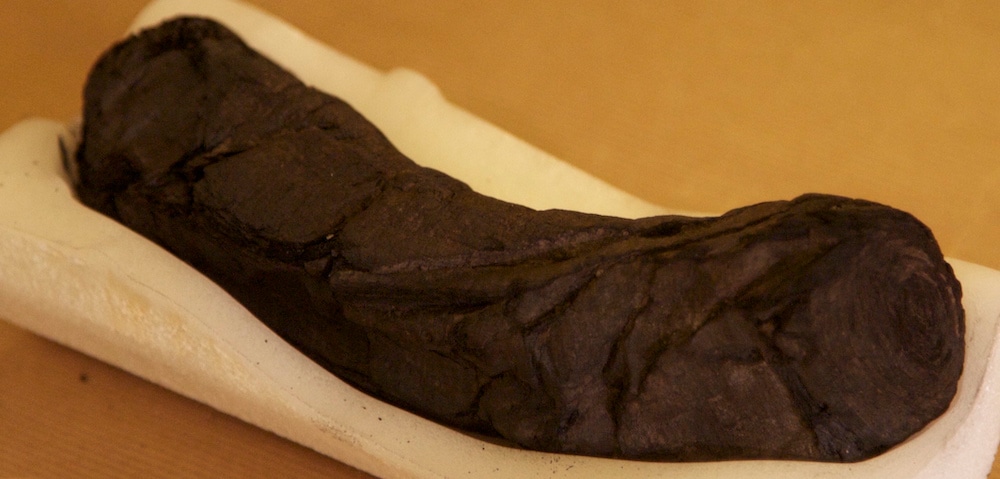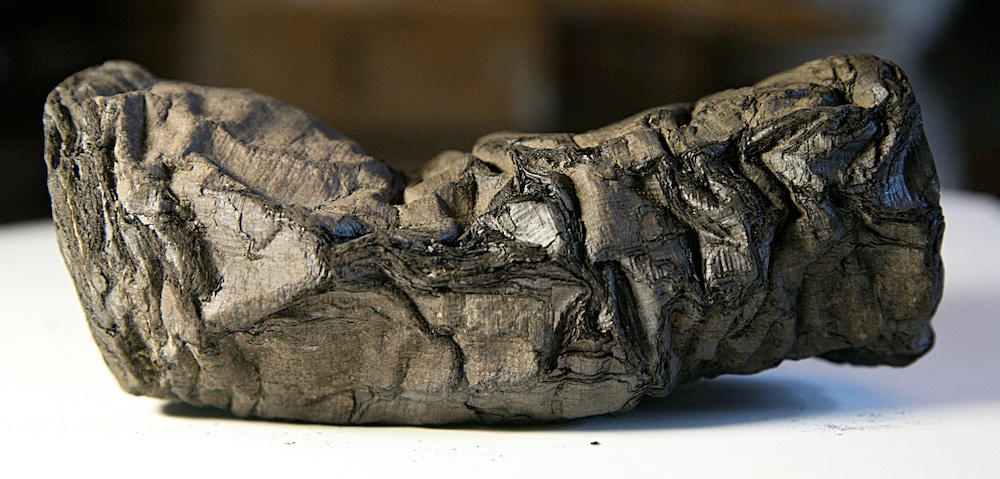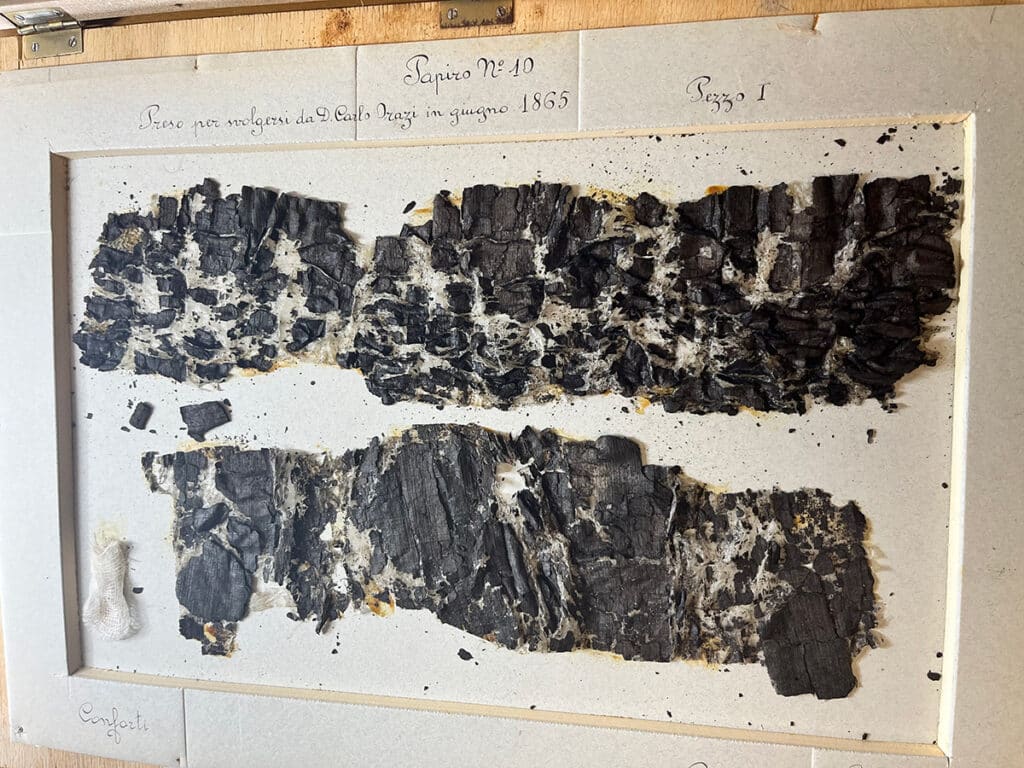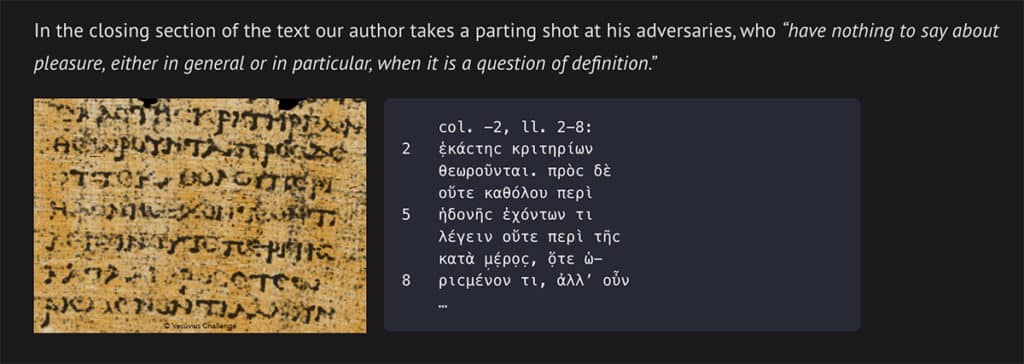Volcanoes are erupting in The Philippines, but on-fire Australia received some welcome rain. The Iran war cries have been called off and The Donald’s military powers are about to be hamstrung by the Senate. Meanwhile, his impeachment trial is starting, and we’re all on Twitter for a front-row seat.
What Could Go Right? A 2,000-Year-Old Blog Post on How to Enjoy Life
Lost to Vesuvius, the library it belonged to can now be read, thanks to Internet nerds.
This is our weekly newsletter, What Could Go Right? Sign up here to receive it in your inbox every Thursday at 5am ET. You can read past issues here.
A 2,000-Year-Old Blog Post on How to Enjoy Life
Two thousand years ago, Mount Vesuvius erupted, destroying the Italian city of Herculaneum along with Pompeii. Buried under 50 feet of volcanic ash, Herculaneum was essentially “vacuum-sealed” by the heavy layering, preserving the buildings and artifacts underneath.
One of those buildings was the Villa of the Papyri, a massive waterfront villa likely owned by Julius Caesar’s father-in-law, where in 1750 excavators discovered nearly 1,800 papyrus scroll pieces. These scrolls, instead of being lit on fire and incinerated by Vesuvius’ plumes of gas, were carbonized, and then covered by a mud flow that protected the papyrus against deterioration from oxygen. The scrolls suffered damage, but the works written on them were also inadvertently saved.
There are about 800 full scrolls that are held in a library in Naples, Italy. But there may be thousands more remaining at the villa, since most of it is unexcavated, and the main library has yet to be found.
Scholars believe they are a trove of ancient Greek and Roman plays, poetry, and philosophy—the only library to survive from that time—and may hold unknown works by the likes of Sappho, Sophocles, and Aristotle.
The only problem? The scrolls are in a condition well described as charred logs.


Two scrolls from the Herculaneum Papyri | Image: The Vesuvius Challenge
They are impossible to fully open and read. Attempts since the 18th century have resulted in something like this:

By the aughts, more advanced X-ray technology had given researchers the opportunity to avoid the “crumble when opened” problem by internally scanning the scrolls and producing a tiny, flattened version of the information inside. Greek letters were detected in one rolled-up scroll. These letters, as well as words on a fragment of a partially unrolled scroll, pointed to Philodemus, an Epicurean philosopher of whom the villa’s owner was a patron, as the author.
Beyond that, researchers were stuck.
And then something random happened that would hoist this challenge outside the circles of academia. Bored at home during the Covid-19 pandemic, the former chief executive officer of GitHub, Nat Friedman, was taken by the mystery of the scrolls. He teamed up with an investing partner and Brent Seales, a computer science professor at the University of Kentucky who had been working on the scrolls for 20 years, to launch the Vesuvius Challenge.
In March of 2023, the Challenge offered $700,000 in prize money—with smaller prizes for achievements along the way, $1 million of prize money in total—to anyone who could decode at least four passages of 140 characters each. (I imagine that number is an old-school Twitter reference, since the contest was announced there.)
They released 3D X-ray scans of two Philodemus scrolls to the Internet. Expectations were low. But then, as the Bloomberg piece ($) on this story delightfully puts it, a “volunteer army of nerds” got to work.

By midnight of January 1st, the Challenge’s winning team delivered over a dozen columns of readable text. Especially after 275 years of failure, the achievement is stunning.

The process works with the help of a machine-learning algorithm, designed by participants in the competition, to find and decode text by identifying “crackle” patterns, dried-out ink sticking up from the page. Another tool is used to stitch together individual sheets of papyrus from the scans.
Luke Farritor, one of the three on the winning team and a 22-year old Nebraskan undergraduate, is also the first person in history to read an entire word from the inside of a Herculaneum scroll. It was the ancient Greek word for “purple.”
The text, it turns out, is a philosophical treatise on pleasure. “As too in the case of food,” Philodemus muses in one passage, “we do not right away believe things that are scarce to be absolutely more pleasant than those which are abundant.”

The Vesuvius Challenge organizers describe it differently, however. “We can’t escape the feeling that the first text we’ve uncovered is a 2000-year-old blog post about how to enjoy life,” they wrote on the prize’s announcement page.
The columns produced and translated by the Vesuvius Challenge represent about five percent of one scanned scroll. They’re launching a second prize in March, with a goal of decoding 90 percent of the four scrolls they have scanned in total since the start of the competition. After that, it’s the rest of the 800 scrolls in Naples!
Much work lies ahead, but this method unlocks a way to eventually read all of the scrolls currently excavated, and a possible motivation for the Italian government to green-light a return to the villa for the rest.
What Could Go Right? S5 E18

Are we defined by our jobs? What happens to ex-presidents after they leave office? And how does that apply to the current political landscape as we head into the 2024 election? Today, we’re joined by Jared Cohen, author of the book Life After Power: Seven Presidents and Their Search for Purpose Beyond the White House, to explore how these leaders transition, redefine their identities, and sometimes find higher callings post-presidency. | Listen now
By the Numbers
94: The percentage of railways in India that are now electrified.
11M: The combined number of electric car sales in 2023 in the EU and China.
44%: The share of renewables in the EU electricity mix in 2023. It is a record and the first time renewables have topped 40 percent.
Quick Hits
🐘 A national park in the Republic of the Congo is celebrating its 30-year anniversary with a first: no elephants killed.
🏗️ The world’s first large-scale green steel plant is gearing up for business after landing a $5.17 billion investment. The steel is produced using clean hydrogen instead of coal, with the first batch ready by 2026 at the latest.
🩸 Elizabeth Holmes’ Theranos, a blood test company that was caught fabricating results, has cast a pall over new blood test technology. But one company has just received FDA authorization for its “MiniDraw” tests, which need only a few drops of blood to work, and could conceivably be used by pharmacists, cutting out lab or clinic trips as well as long waits.
🧬 The genetic mutation for lupus has been discovered, opening up a new pathway for treatment that would not have to rely on anti-inflammatory drugs. And, a gene therapy for a rare disease that causes “painful and potential fatal swelling” has been successful in a small, phase-one trial in the UK, New Zealand, and the Netherlands. After the therapy, which uses the gene editing tool CRISPR, patients report having no swelling attacks without being on medication.
🇿🇲 In an attempt to end child marriage, Zambia’s parliament has outlawed marriage below the age of 18. A 1964 law on the books that had no age restrictions for customary marriages had been a loophole for decades, which is now closed.
🇿🇼 Zimbabwe has moved its age of consent for sexual relations to 18, a move to curb young girls being married off to older men under the guise of religious practices.
🌈 In October, Japan’s Supreme Court ruled that it was unconstitutional to require sterilization in order for a transgender person to change their gender on official documents. Tacaquito Usui, 50, just became the first transgender man to have his gender change approved after this ruling, with a lower court finding that hormone therapy sufficed for his request to be honored.
📱 The FCC has made AI robocalls illegal. If you have been called by an AI-generated voice, the new regulation allows lawsuits!
😮💨 Less than one percent of US teens smoke on a daily basis, down from 10 percent in 1991.
🫀 There is a new entry to the Guinness Book of World Records: a Dutch man has been recognized as the longest-surviving heart transplant patient. He has had the donor heart for almost 40 years.
👀 What we’re watching: The new government in Poland is trying to reverse a 2017 law that required women to get a prescription for the “morning after pill.” At the time, the country’s health minister, who is also a doctor, commented that he would refuse to prescribe such pills even to a rape victim.
TPN Member Originals
(Who are our Members? Get to know them.)
- Trump’s middle class tax hike | Slow Boring | Matthew Yglesias
- Michigan mom convicted in mass shooting case | Tangle | Isaac Saul
- Access to voting should not be a fairy tale | WaPo ($) | Theodore R. Johnson
- Two takes on America’s emerging (maybe) productivity boom | Faster, Please!| James Pethokoukis
- How to fix the nightmare of modern flying | WaPo ($) | Bina Venkataraman
- Condoms are now covered by the ACA: Who knew? | Of Boys and Men | Richard V. Reeves
- Schopenhauer’s advice on how to achieve great things | The Atlantic ($) | Arthur C. Brooks
- The new lab leak evidence | Nonzero | Robert Wright
- Trump came for their party but took over their souls | NYT ($) | David Brooks
- How Taylor Swift’s soft power calculus could impact this election year | Forbes | Penny Abeywardena



[…] AI’s most enjoyable contribution this yr, nonetheless, was the work it did beneath the watchful eye of a “volunteer military of nerds” to decipher scrolls, unreadable for 275 years, that had been buried when Vesuvius erupted. The expertise has revealed […]